
The National Oceanic and Atmospheric Administration Commissioned Officer Corps, known informally as the NOAA Corps, is one of eight federal uniformed services of the United States, and operates under the National Oceanic and Atmospheric Administration (NOAA), a scientific agency overseen by the Department of Commerce. The NOAA Corps is made up of scientifically and technically trained officers. It is one of only two U.S. uniformed services – the other being the United States Public Health Service Commissioned Corps – that consists only of commissioned officers, with no enlisted or warrant officer ranks. The NOAA Corps primary mission is to monitor oceanic conditions, support major waterways, and monitor atmospheric conditions.

William Oliver Studeman is a retired admiral of the United States Navy and former deputy director of the Central Intelligence Agency, with two extended periods as acting Director of Central Intelligence. As deputy director of Central Intelligence, he served in the administrations of George H. W. Bush and Bill Clinton under three directors of Central Intelligence, Robert Gates, R. James Woolsey Jr., and John M. Deutch. Studeman retired from the navy in 1995 after almost 35 years of service. Between 1988 and 1992 he was director of the National Security Agency; he was the Director of Naval Intelligence, from September 1985 to July 1988.

John Francis Lehman Jr. is an American private equity investor and writer who served as Secretary of the Navy (1981–1987) in the Ronald Reagan administration where he promoted the creation of a 600-ship Navy. From 2003 to 2004 he was a member of the 9/11 Commission.
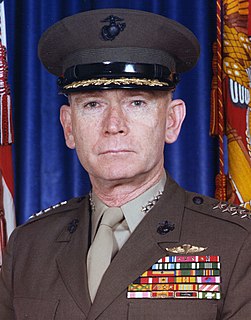
Paul Xavier Kelley was a United States Marine Corps four-star general who served as the 28th Commandant of the United States Marine Corps from July 1, 1983, to June 30, 1987.

Stansfield Turner was an admiral in the United States Navy who served as President of the Naval War College (1972–1974), commander of the United States Second Fleet (1974–1975), Supreme Allied Commander NATO Southern Europe (1975–1977), and was Director of Central Intelligence (1977–1981) under the Carter administration. A graduate of University of Oxford and the United States Naval Academy, Turner served for more than 30 years in the Navy, commanding warships, a carrier group, and NATO's military forces in southern Europe, among other commands.
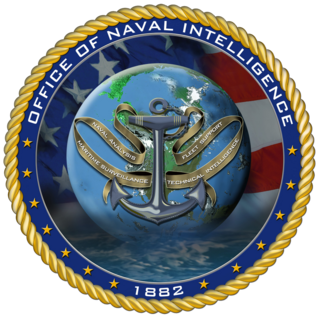
The Office of Naval Intelligence (ONI) is the military intelligence agency of the United States Navy. Established in 1882 primarily to advance the Navy's modernization efforts, it is the oldest member of the U.S. Intelligence Community and serves as the nation's premier source of maritime intelligence.

Lieutenant General Michael David Maples, USA served as the 16th Director of the Defense Intelligence Agency (DIA), appointed on November 4, 2005. He was promoted to lieutenant general on November 29. Maples also commanded the Joint Functional Component Command for Intelligence, Surveillance and Reconnaissance (JFCC-ISR) for the United States Strategic Command (USSTRATCOM). He transferred his Directorship of the Defense Intelligence Agency and his command of JFCC-ISR to LTG Ronald Burgess on March 18, 2009. Maples formally served as the vice director of management of the Joint Staff.
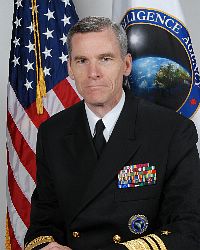
Vice Admiral Robert Brendan Murrett was the fourth Director of the National Geospatial-Intelligence Agency, from 7 July 2006 through July 2010. In 2011, Murrett joined the Institute for National Security and Counterterrorism at Syracuse University where he now serves as deputy director. He is also a faculty member of the Maxwell School of Citizenship and Public Affairs, and serves on the IVMF advisory board at Syracuse University.
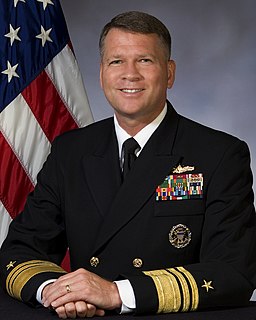
David John "Jack" Dorsett is a corporate vice president for cyber and C4 at Northrop Grumman, and a retired vice admiral of the U.S. Navy. He was the first Deputy Chief of Naval Operations for Information Dominance and 63rd Director of Naval Intelligence. He served as the Director of Intelligence, Joint Chiefs of Staff from 2005 to 2008 prior to assuming his position on the Chief of Naval Operations staff.
Perry Michael Ratliff is an officer of the United States Navy and a former Director of Naval Intelligence. Since retiring from active duty with the Navy, Mike Ratliff served as Executive Director of the American Civic Literacy Program, and, since 2004, first as Executive Director and then President of the Jack Miller Center, a non-profit educational foundation.
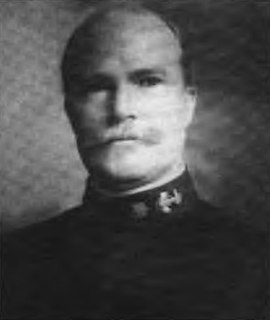
Henry Francis Bryan was a United States Navy Rear Admiral and the 17th Governor of American Samoa. He served as governor from March 17, 1925 to September 9, 1927. Bryan was one of only three naval governors of the territory who had retired from naval service before serving as governor, the others being John Martin Poyer and his immediate predecessor, Edward Stanley Kellogg. In the Navy, he had numerous commands, and served in the Spanish–American War. His largest command was the Special Service Squadron.

The National Maritime Intelligence-Integration Office(NMIO) is a United States Navy entity located in the National Maritime Intelligence Center (NMIC) Facility in Suitland in Prince George's County, Maryland, southeast of Washington, DC. It is a part of the Suitland Federal Center.

Arthur Howard McCollum was an American Naval Officer as well as a key member of the Intelligence agency in the Southwest Pacific. He was born in Nagasaki, Japan to two Baptist Missionaries. He spent several years in Japan after his graduation from the Naval Academy, granting him a large amount of knowledge about East Asia and the Southwest Pacific that proved key in his interactions with Naval Intelligence.
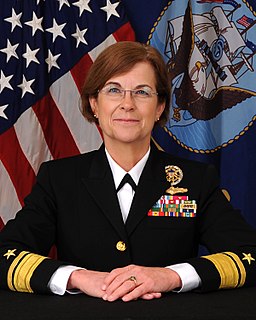
Elizabeth Langdon Train is a retired United States Navy rear admiral who was the Commander, Office of Naval Intelligence and the Director, National Maritime Intelligence-Integration Office. Train is a third generation naval officer, her father is Admiral Harry D. Train II and her grandfather is Rear Admiral Harold C. Train.

Scott David Berrier is a lieutenant general in the United States Army who serves as the Director of the Defense Intelligence Agency. Berrier was confirmed by the United States Senate as the 22nd Director of the Defense Intelligence Agency on July 30, 2020, replacing the retiring Lieutenant General Robert P. Ashley Jr. He previously served as the Deputy Chief of Staff of the Army G-2 (intelligence). He received his officer's commission in 1983 through the ROTC program at the University of Wisconsin–Stevens Point.

Vernon Long "Rebel" Lowrance was a United States Navy officer who served as a submarine commander during World War II and later became director of the Office of Naval Intelligence. Promoted to vice admiral, he commanded Submarine Force Atlantic and then served as deputy director of the Defense Intelligence Agency.

Frederick Joseph "Fritz" Harlfinger II was a United States Navy officer who served as a submarine commander during World War II and later commanded the South Atlantic Force of the U.S. Atlantic Fleet. He then served as director of the Office of Naval Intelligence and finally as director of Command Support Programs in the Office of the Chief of Naval Operations, with the rank of vice admiral.

Gene Forrest Price is a United States Navy rear admiral who serves as Reserve Deputy Commander of the Naval Information Forces since 2017, and dual-hatted as Commander of the Naval Information Force Reserve from 2017 to 2020. He served as interim Director of the National Maritime Intelligence-Integration Office and interim Commander of the Office of Naval Intelligence from January 24, 2019 to June 17, 2019 and again from May 3, 2021 to June 18, 2021.

















